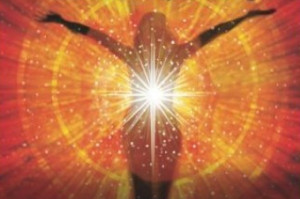
Friendship with Our Body
This is the second week in a five-part series based on John O’Donohue’s book, Anam Cara, and Celtic Spirituality. Last week we talked about Soul Friendship, this week we discuss Friendship with Our Body (a concept that we’ve been hard-pressed to find in Christianity). Let’s start with a little background...
The concept of the sinfulness of the body in Christianity, and especially women’s bodies, began over eight thousand years ago when the patriarchal societies of Europe with their male gods invaded the areas of Egypt and Mesopotamia conquering peaceful, agrarian societies where the goddess was worshiped, peace reigned, people were more equal, and the body was a sacred gift from God, as was sexuality, fertility and bearing children.
By the time we get to the book of Leviticus in Old Testament (written around 1400 BCE), women have become property and their bodies are seen as unclean because of their menstrual cycle. Even childbirth, because of the blood involved, was considered something that made women ceremonially unclean. Leviticus 12 states: “When a woman conceives and bears a male child, she is ceremonially unclean, as she is during her time of menstruation, for seven days. On the eighth day the child is to be circumcised. It takes 33 days for the mother’s blood to be purified; she must not touch sacred objects for enter the sanctuary until after the 33 day. When she gives birth to a daughter, she will be ceremonially unclean, as during her time of menstruation, for two weeks. Then it takes 66 days for her blood to be purified.”
In the time of Plato and Aristotle (circa 400 BCE), these Greek philosophers firmly believed in the duality of body and soul. While the soul was believed to be beautiful, bright and good and close to God, the body was filled with lower, base desires and was of the earth. The clear implication was that to take the higher path one must concern themselves with things of the spirit and denounce things of the flesh.
This thought process was picked up by the Apostle Paul, from whom we have the earliest New Testament writings (about 15-20 years after Jesus’ death). In his letter to the Galatians, he writes “… our flesh is at odds with the Spirit – and the Spirit with our flesh…” And, in Romans 8:13, he says “If you live according to the flesh, you will die, but if you live by the Spirit, you will put to death the evil deeds of the body and you will live.” Paul repeats these basic themes over and over again in his epistles.
By the time we get to the later Gospels of Matthew and Luke (written some 40-60 years after Jesus’ death), we find that the most honored woman of the church is Mary whose best traits are that she was a Virgin and obedient. And despite the fact that the Bible talks about the other children she had, the Catholic Church eventually declares that she was a perpetual virgin. (We wouldn’t want to mar her reputation by having her involved in something as lowly and sinful as sexual intercourse.)
The traditional church, and certain other religious paths, have made it clear that denying the body – whether in becoming a celibate priest or nun, or fasting, or living as a hermit or an ascetic – was the highest spiritual path one could take because it denounced anything that was pleasurable for the body. Eventually many churches even denounced dancing and drinking, card-playing and going to movies because those things were associated with pleasures of the flesh.
 In Celtic spirituality; however, there was no separation of [inner light] body and soul. As John O’Donohue asserts, “Each was natural to the other. The soul was the sister of the body, the body the sister of the soul.”
In Celtic spirituality; however, there was no separation of [inner light] body and soul. As John O’Donohue asserts, “Each was natural to the other. The soul was the sister of the body, the body the sister of the soul.”
I believe, and I think Celtic spirituality would support this, that our souls and the Divine completely permeate our bodies. We know that our energy field extends beyond our body. Some people talk about our auric field, but even if you don’t believe in that, we know that we can sense what kind of mood someone is in before we touch them, because our energy reaches outside our physical bodies. And, while we speak of the Divine Spark within, I truly believe that the energy of God is more than a little tiny spark. I believe the energy of God has no boundaries and so fills us completely. If this is true, then our bodies are gracious homes for our souls while we are on this earth, and are absolutely (as 1 Corinthians 6:19 says) temples of the Holy Spirit who is within us!
O’Donohue says, “To describe the body as the temple of the Holy Spirit recognizes that the body is suffused with wild and vital divinity. This theological insight shows that the sensuous is sacred in the deepest sense.” It is through our senses that the invisible becomes visible, that the untouchable becomes touchable.
Our bodies are conduits/thresholds between the soul and the divine and the world. Here are a few examples…
O’Donohue tells a story about a journalist friend of his who met an old Indian chief in South American whom he wanted to interview. The old man agreed “on the condition that they could have some time together beforehand.” The journalist agreed, assuming this would simply include some chit-chat and normal getting-to-know-you conversation. “Instead, the chief took him aside and looked directly into his eyes in silence for a long time. Initially, this terrified y friend; he felt his life was totally exposed to the gaze and silence of this stranger. After a while, the journalist began to deepen his own gaze. Each continued this silent gazing for more than two hours. After this time, it seemed as if they had known each other all of their lives. There was no longer any need for the interview.”
Our body and senses are how we experience the awe and wonder of the divine in the world around us. And our bodies enable us to give expression to divine love, beauty, compassion, playfulness of our souls.
Jean Shinoda Bolen is a psychiatrist. In her book, Crossing to Avalon, she tells of a time when she was more tired than she knew and was heavy with grief from recent events in her life. She sat with her client and the woman sensed something and reached out with compassion to ask if she was all right. When her eyes filled with tears, her client broke out of her role, moved to her side and simply held her. Bolen said, “At that moment I felt that a much larger presence was there with the two of us. When this woman put her arms around me, I felt as if we were both being cradled in the arms of an invisible, divine presence.”
Yes, our bodies are precious and holy sacraments – visible signs of an invisible grace. It is time we reclaimed this understanding and began to heal our relationship with our bodies. When we let go of the dualistic thinking that says the spirit is good and the body is bad, and recognize oneness of body and soul, it will change how we live. Developing a friendship with our bodies – a caring for and compassion for our physical selves – is vitally important for a healthy spirituality and life.
What does friendship with our bodies look like?
- Exercise
- Eat healthy
- All things in moderation
- Don’t work against the body by saying hateful things to it
- Be grateful to our bodies, thank them
- Listen to it our bodies
- Be aware of the gift of our senses
- Be mindful of how our bodies are outward expressions of God and soul
- Be aware of how past and present hurts/baggage manifest in our bodies
- Be aware that it hurts our very souls when we use our bodies – touch, words, looks – to hurt others
- The body is not a thing to be mastered, but a partner to work with. We can work with or against our bodies every day
The spiritual path strives for oneness, not dualism, which leads us to stop separating our bodies from our spirits and recognize the connection and interaction. It is time to remember that our bodies are beautiful, miraculous instruments of the soul and the divine that encompass it.
Love & Light!
Kaye



